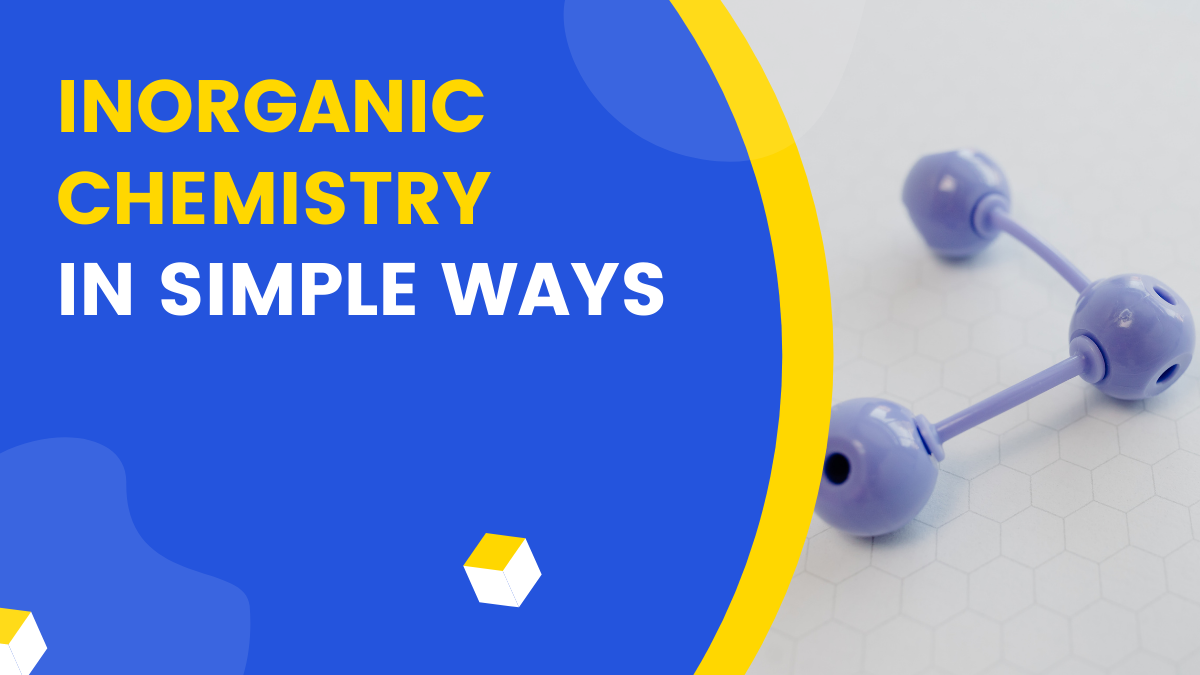Inorganic chemistry deals with the synthesis and behavior of inorganic and organometallic compounds and covers all chemical compounds except the myriad organic compounds (carbon-based compounds), which are the subjects of organic chemistry. Inorganic chemistry has applications in every aspect of the chemical industry, including catalysis, materials science, pigments, surfactants, coatings, medications, fuels, and agriculture.
IMPORTANT BOOKS ON INORGANIC CHEMISTRY –
R.K.Gupta – Arihant Publication
O.P.Tandon – GRB
J.D.Lee and Sudarsan Guha – Wiley.
For the Practice Part, there are 4 best books:-
V.K Joshi – Cengage
Kapil Kumar – GRB
Navneesh Bansal – Wiley
VK Jaiswal – Balaji.
Inorganic chemistry is one of those parts of JEE/ NEET where maximum marks can be scored with comparatively fewer efforts.
Most JEE aspirants view Inorganic Chemistry as cramming. While it is true to some extent, I will try to defy this generalization to some extent here.
Before starting to read any inorganic chapter, you need to ensure two things:
You memorize elements up to atomic number 30 of the periodic table. Also, groups 1–2 and 13–18 need to be remembered alongside which you will be comfortable with passing time.
You know how to draw Lewis Structures if the formula of a compound is given and have a good feeling of concepts of Chemical bonding like formal charges, VSEPR theory, deducing geometry and shapes of compounds, calculating oxidation states, balancing of redox reactions, etc.
When you are comfortable with both of the above-mentioned points, you are set to study inorganic chemistry.
Develop the habit of writing. Most of us try to cram facts just by reading them. For me, it didn’t go well. When you are reading inorganic chemistry, try to remember the important points and jot them down on a piece of paper. The more you write, the more the facts get set into your mind.
Try to develop analogies to remember things. It is not possible to remember facts in their original format.
Try to make a list of all exceptions separately. Most of the questions in inorganic chemistry are formed from the exceptions. Hence it is recommended to maintain a separate list of all exceptions and try to revise them during your free time. The more you revise, the more things you will be able to remember.
If you have a good command of the structure of known compounds, it becomes very easy sometimes to guess the products of a reaction. For example, in most of the hydrolysis and dehydration reactions; remembering the structure of an original compound is enough to deduce the products.
Remember the standard oxidation states of some elements (especially d-block elements). Whenever you would be given a redox reaction, you can easily guess the product if you know the standard oxidation states in which that element preferentially exists.
Never skip NCERT Exemplars, especially when it comes to inorganic Chemistry. The question bank given in exemplars ought to be done once/twice when you are finished reading a chapter from NCERT. The questions there have been formed JEE syllabus.
Try to revise your inorganic chemistry lectures at least 2–3 times. Most of the JEE coaching institutes know what part has to be taught for JEE and hence ignoring the lectures will cost you only.
After finishing your NCERT, NCERT Exemplar, and Class Notes; the priority must be the archive. By ‘archive’, I mean the past years’ questions related to that specific topic asked in JEE. If your coaching doesn’t give you an archive, you can always buy a book named “39 years” which is published by Arihant/ Disha. It is recommended to do both objectives as well as subjective questions from the archive.
Make short notes always. As you are reading/ revising a chapter, jotting down important points should suffice. At a later stage, you will never feel the need to read the whole NCERT again if you’re ready with your short notes.
For inorganic chemistry, NCERT should be your bible. When I say this, I mean it. Each and every word written in NCERT becomes important with respect to JEE Main, Neet, and biology. For Advanced, there are some things to be studied apart from NCERT. But don’t worry, they will be inculcated within your coaching material and class notes.
Remember that ignoring inorganic chemistry can prove to be very costly. Inorganic Chemistry will always fetch you more marks with fewer efforts. Solving an inorganic chemistry question is much easier than solving a lengthy mathematics question in an exam, whereas both fetch you equal marks. You see, Inorganic is one of the weaknesses of JEE or NEET syllabus which every aspirant should try to take advantage of.
Well, for your easy and smooth preparation of the exams, we have brought DOUBTBUDDY near you. All you do is scan your ques and upload them; you get answers in seconds with teachers just with you to give a detailed explanation for your further clarification. We have faculties with us having a great experience and always ready to help you all. So what are you waiting for,
Download DOUBTBUDDY now- https://play.google.com/store/apps/details?id=com.doubtbuddy.student
For more information visit our webpage https://www.doubtbuddy.com/



